Basil is an essential aromatic herb for both the garden and the kitchen windowsill. Its fragrant leaves enhance salads, marinades, or pesto. Easy to grow, sowing basil is within reach of all gardeners, even without a garden, as it thrives in pots or planters.
Discover, through our step-by-step tutorial, how to successfully sow basil in pots or directly in the garden soil!
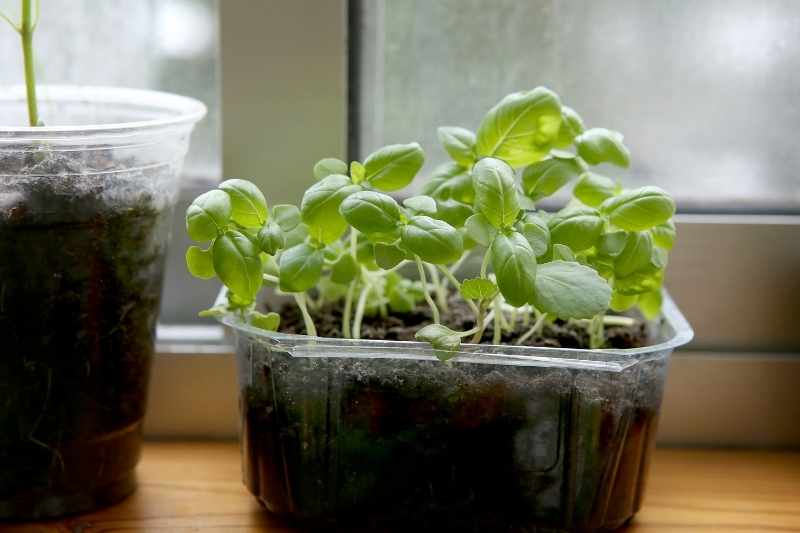
When to sow basil?
Basil can be sown in many ways. You can sow basil seeds indoors with warmth, under unheated cover, or directly in open ground. The sowing period varies depending on the method used.
Sowing basil with warmth
You can start sowing basil from February to April indoors by a sunny window or in a heated mini greenhouse. Keep them indoors at a suitable temperature (it needs above 20°C to germinate). Transplant the strongest seedlings to the garden once all risk of frost has passed. Allow about 2 months between sowing and outdoor planting. After 2-3 weeks, seedlings started with warmth will need hardening off: gradually acclimatise them to seasonal temperatures by placing them in direct sunlight during the day and bringing them indoors at night to protect them from chilly evenings. They can then safely be moved outdoors.
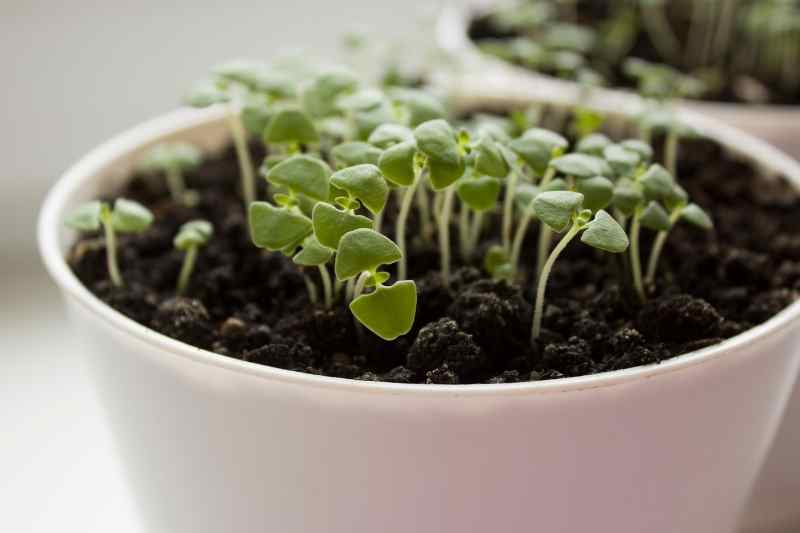
Sowing basil indoors
Sowing in a cold frame
Late sowings in April-May can be done in a cold frame.
Sowing in open ground
Basil is a frost-sensitive annual plant. It should only be planted outdoors in the garden or in pots once heavy frosts are no longer a threat, typically after the Ice Saints period, i.e., after mid-May, depending on the region and climate. Wait until temperatures warm up. From May to July, you can safely sow basil directly outdoors.
My tip: stagger basil sowings every two months to have tender young shoots until early autumn.
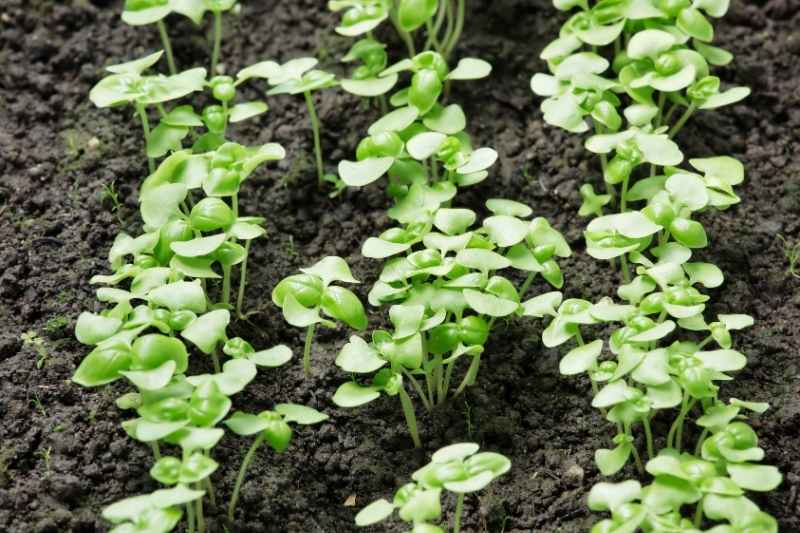
Direct sowing in open ground is done around mid-May
Required materials
To sow your basil seeds, you will need, depending on the chosen method:
- a mini greenhouse or biodegradable seed trays
- biodegradable pots and buckets or plastic bottles
- good seed and potting compost
- a spray bottle
- scissors or a cutter to cut the bottle
- a sharp knife to pierce it
- a hand hoe to mark sowing furrows
- a trowel to transplant small seedlings
- a rake
How to sow in pots, trays, or bottles?
For plants to transplant into pots or the garden! It's important not to sow the seeds too deeply, as they need light to germinate.
Sowing in pots
- Step 1: Fill your pots with good compost and lightly firm
- Step 2: Make 2 to 4 holes per pot
Step 3: Place 2 seeds per hole, pressing them 3 mm deep with your finger (up to 5-10 seeds per pot) - Step 4: Cover with compost
Step 5: Water with a spray bottle - Step 6: Place in a mini greenhouse or cover to retain moisture, warmth, and allow light through
Sowing in trays
- Prepare your trays by filling them with seed compost
- Sow your seeds sparingly, spacing them a few centimetres apart
- Cover with a 1 mm layer of compost
- Water generously with a fine spray to moisten the substrate well
- Keep moist until germination (neither too wet nor too dry)
- Cover (with a transparent lid, plastic bag, glass, cling film…) to encourage germination
- Place your sowings in a bright spot but out of direct sunlight, at a minimum temperature of 20°C
- Ventilate regularly
- Monitor to prevent damping off
- When seedlings have more than three true leaves, transplant them carefully into individual pots
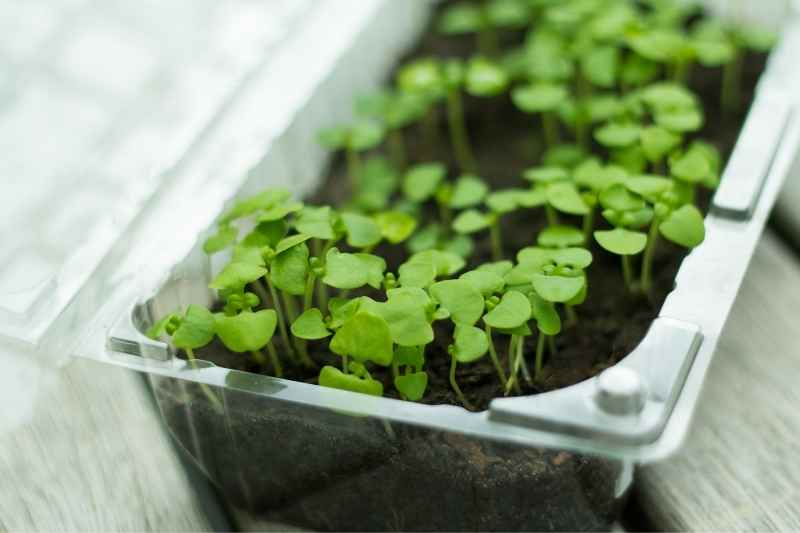
Sowing can be done in a tray with a lid acting as a mini greenhouse
Sowing in bottles
- Using a cutter or scissors, cut a 1.5-litre plastic bottle in half, keeping only the lower part
- With a sharp knife, make 3 or 4 small holes in the bottom for drainage
- Fill two-thirds with clay pebbles and moisten with water
- Fill the bottle halfway with seed compost
- Moisten the compost
- Place 2-3 basil seeds, spaced 2 cm apart, on the compost surface
- Cover with about 5 mm of compost
- Firm lightly
- Place near a heat source, at 20-25 °C
- Once plants are well-developed, remove the root ball (cutting the bottle if needed) and transplant into open ground or pots, keeping only the strongest plants
Transplanting
Germination takes 10–15 days. When shoots are well rooted and about 5 cm tall (once true leaves appear), it's time for intermediate transplanting into slightly larger pots filled with compost if you can't yet plant outdoors. Wait until plants are 10 cm tall (4–6 leaves) before planting them directly in the garden. Keep them under a warm frame, watering regularly. Transplant your young plants into the garden using a trowel, spacing them 20 cm apart, or into pots, containers, or planters filled with vegetable garden and herb compost, enriched with compost if needed. Transplanting basil can be tricky, so I recommend sowing in biodegradable pots: the roots remain intact during transplanting. They also store watering water well.
Basil can also remain in pots for easy access in the kitchen.
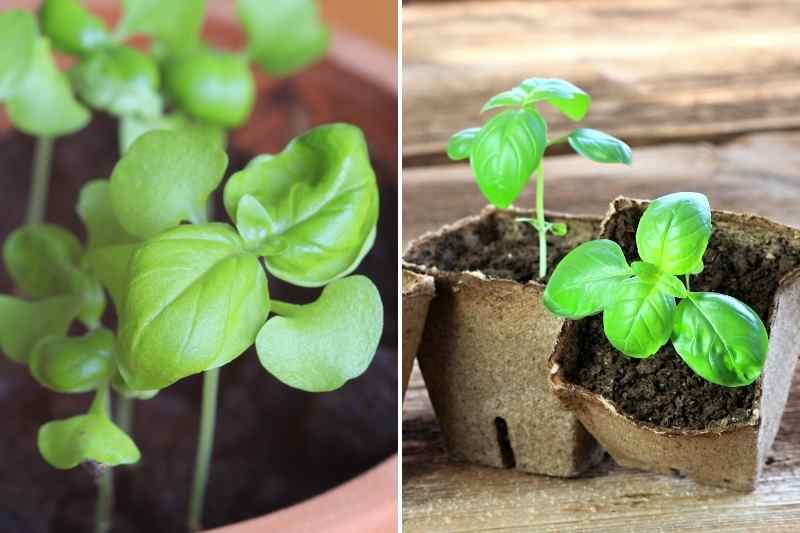
Transplanting is done when basil has developed true leaves
How to sow basil in open ground?
Choose a warm, sunny spot, partial shade in hotter regions, sheltered from wind, with fresh, loose soil enriched with compost. The soil should be loosened and weeded before sowing.
- Loosen the soil without turning it, using a broadfork
- Remove large stones and roots
- Level the soil with a rake
-
Sowing in rows
Basil can be sown in rows, for example between two rows of tomatoes in a vegetable garden:
- Step 1: Mark a furrow with a hand hoe
- Step 2: Sow 1 seed every 5 cm
- Step 3: Cover with compost, firm with the back of a rake
- Step 4: Water with a fine spray
- Step 5: Thin out when seedlings have 2-3 true leaves, leaving 25 cm between plants
-
-
Keep the soil moist during the first few weeks after sowing.
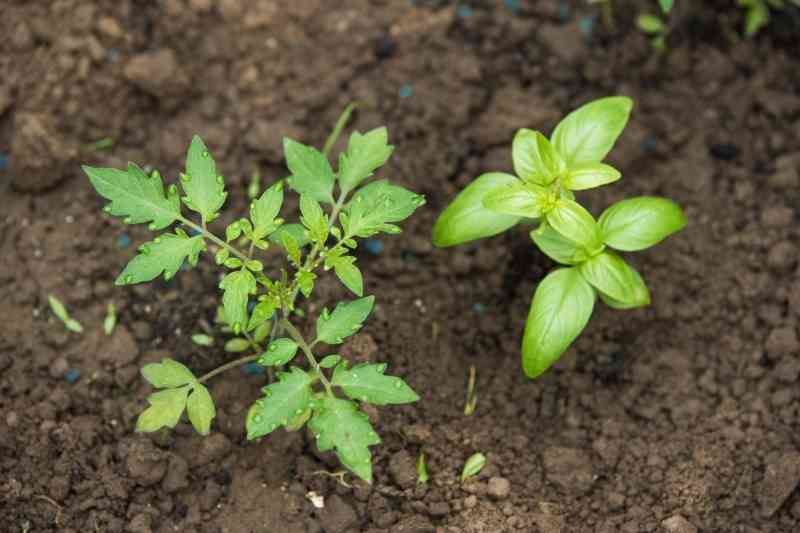
Thinned sowings of tomatoes and basil in the vegetable garden
How to sow basil in pots?
If you don't have a garden, you can sow basil seeds directly in planters or pots. Keep the pot warm indoors by a sunny window.
- Step 1: Add a 2-5 cm layer of clay pebbles
- Step 2: Fill three-quarters of the pot with good vegetable compost
- Step 4: Press 2 seeds 3 mm deep with your finger, spaced about 2 cm apart across the pot's surface
- Step 5: Cover by gently pulling compost over with your fingers
- Step 6: Water with a fine spray and keep moist during germination
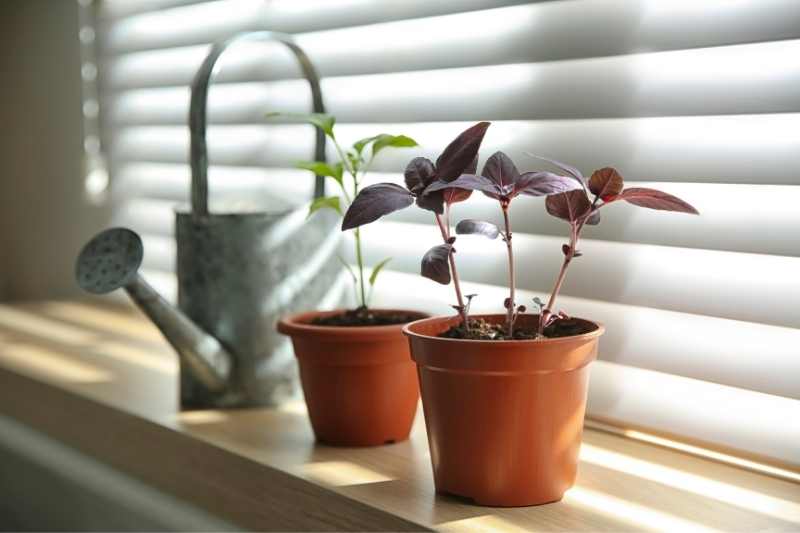
How to collect basil seeds?
In summer, basil will produce spikes of small white or purple flowers, which, once pollinated, develop into tiny seeds. Once flower stems are completely dry, seeds will detach easily: cut the stems and shake them upside down over newspaper or a clean cloth. Store them until next spring for sowing.






























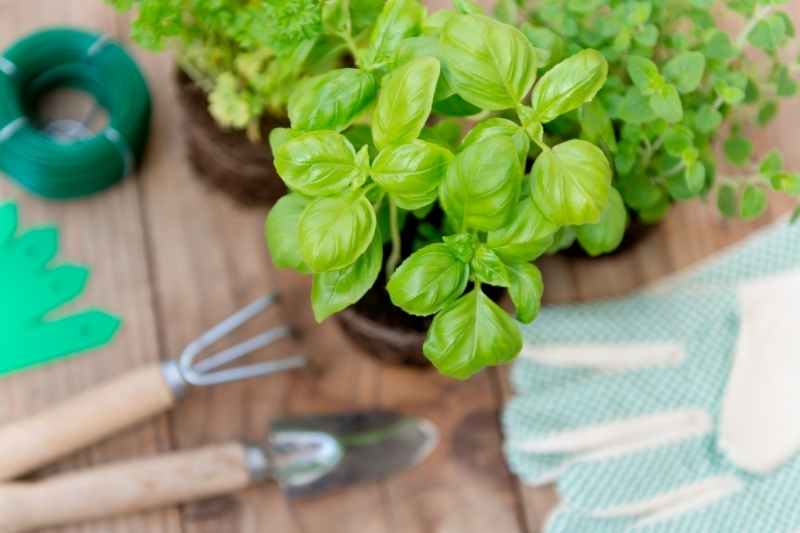
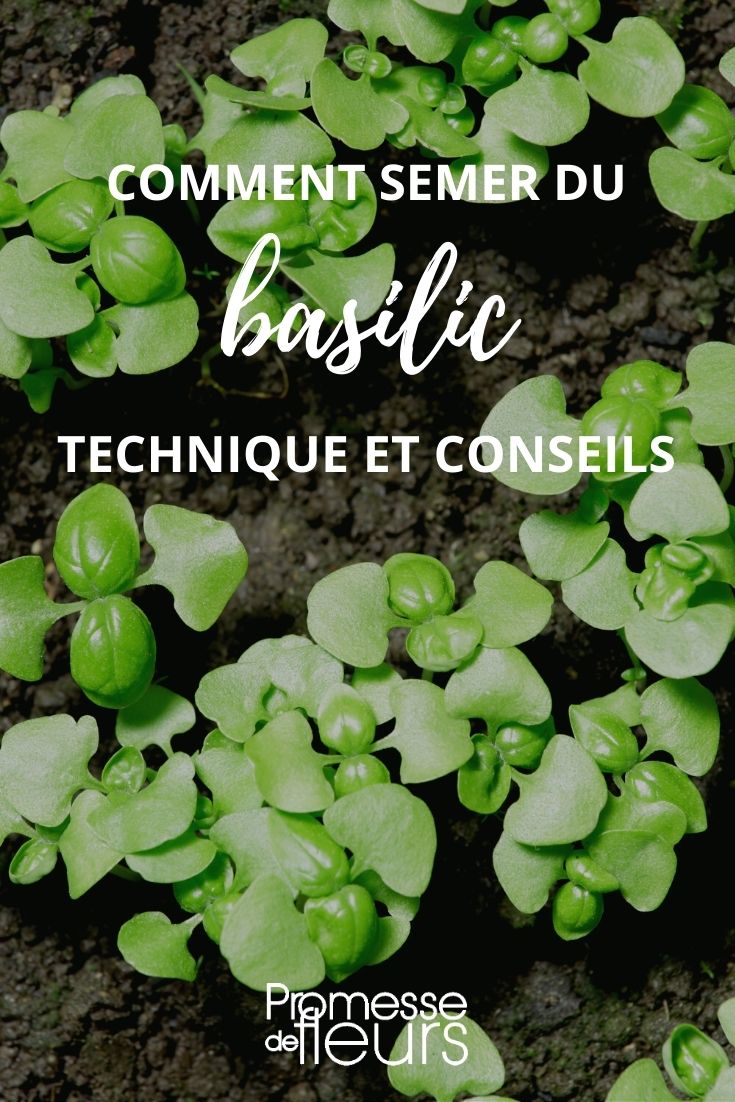
Comments